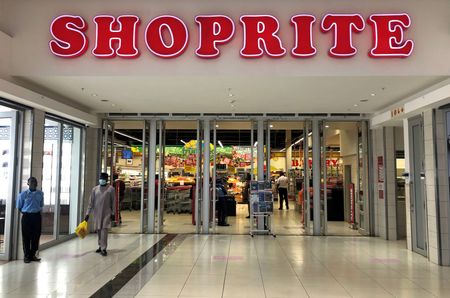 1
1 1
1

By Nqobile Dludla
JOHANNESBURG (Reuters) -Shares in Shoprite Holdings slid 7% on Tuesday after South Africa’s No. 1 grocer reported lower-than-expected profit and a narrower trading margin, while promising to hold down prices to keep attracting customers as they feel the inflation squeeze.
The discount chain with stores in 11 African countries raised its final dividend to 3.67 rand ($0.21) per share, up from 3.53 rand, although one fund manager said it was still lower than investors had been looking for.
“The dividend was probably expected to be higher, but we must keep in mind that consumer inflation is still high,” said Gryphon Asset Management portfolio manager Casparus Treurnicht, adding shares were sliding after a strong run higher this year.
Chief Executive Pieter Engelbrecht told Reuters the group’s new Employee Trust payment programme might have distorted investor expectations about headline earnings per share (HEPS) growth, which was diluted by 3% because of the payout.
Shoprite’s basic HEPS, the main profit measure in South Africa, from continuing operations rose 10.3% to 1,055 cents. The company maintained its gross profit margin at 24.5% but its trading margin fell slightly to 6% from 6.1%.
“Although actual diluted HEPS was below consensus expectations, Shoprite’s overall performance was still solid nonetheless,” said Zinhle Mayekiso, equity analyst at Anchor Capital.
Lower income shoppers flocked to Shoprite’s discount store chains for everything from groceries to household supplies, enticed by promotions as inflation drives up basic food prices.
Customer visits in the financial year ended July 3 grew 5%, with average basket spend rising 4.9%. Internal selling price inflation at 3.9% for the group was below South Africa’s inflation, at 3.9% for the group, Shoprite said.
Sales by the group, with more than 2,900 stores across Africa, grew 9.9% to 184.1 billion rand, while its core South African supermarkets business increased sales by 10.1%.
Engelbrecht told analysts Shoprite invested an additional 856 million rand in promotional discounts on essential food items and would keep holding down prices.
“We have noticed that we are selling more items on promotion than before,” he said, adding consumers were increasingly switching to private label alternatives.
($1 = 17.2352 rand)
(Reporting by Nqobile Dludla; Editing by Louise Heavens and Edmund Blair)